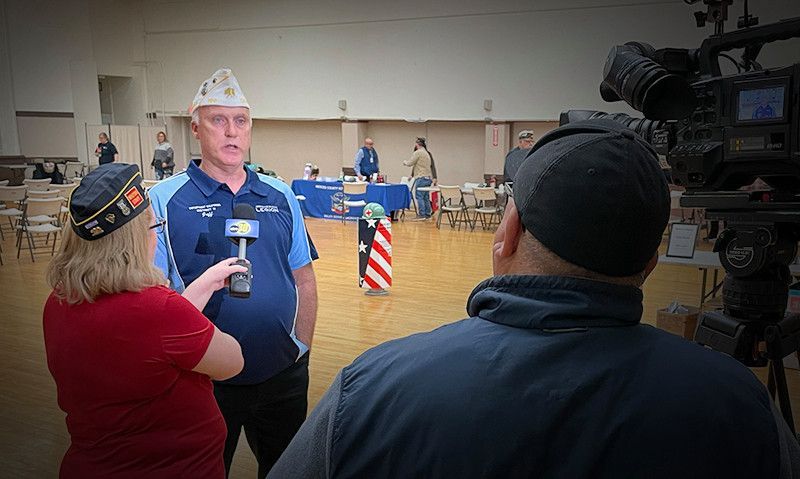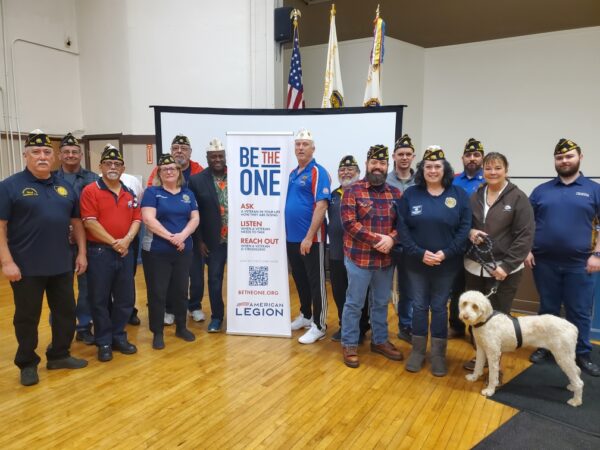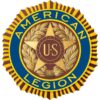
Legionnaire Jeffrey Freeman shares his Be the One story. Photo by Henry Howard
This article was written by Henry Howard and was originally published on Legion.org
Jeffrey Freeman shared his story of surviving a suicide attempt for the first time to a live audience.
“This is a topic that is very near and dear to my heart,” said Freeman, an Air Force veteran and member of American Legion Post 190 in Ripon, Calif. Freeman, who had previously shared his story on The American Legion Tango Alpha Lima podcast, relayed how a back injury, subsequent fibromyalgia and inability to work led him down a spiral.
“I can say the Legion saved my life,” Freeman said during a presentation at a Veterans Campaign Awareness event Feb. 18 in Merced, Calif. “It was 10 years ago next month when I attempted suicide. And in the process of my recovery, I joined the Legion and that’s what gave me what I needed in the past 10 years. It gave me purpose. It gave me a mission. Be the One is a fantastic campaign because anyone can ‘Be the One.’”
The American Legion is highlighting the initiative, which aims to reduce the rate of veteran suicide by raising awareness and destigmatizing mental health treatment. Freeman’s presentation played a prominent role in the Feb. 17-19 event at American Legion Post 83 in Merced, Calif. The beefed-up revitalization connected veterans with service officers, raised awareness about suicide prevention and more.
 Freeman, the California Area 3 vice commander, is the architect of the event. He drew a parallel between his mission and that of Be the One.
Freeman, the California Area 3 vice commander, is the architect of the event. He drew a parallel between his mission and that of Be the One.
“If I can save the life of one veteran with my story, then I’ve accomplished my goal,” he explained. “By telling my story I can get veterans to realize the stigma of mental health treatment is not true. Asking for mental health treatment is not a weakness, it is a strength. If I can get anyone understanding that and getting help, then I have accomplished my goal.”
American Legion Department Chaplain Dave Whalen also spoke about Be the One.
“That’s what we need,” he said, referring to Freeman. “People talking about their experience and educating our comrades. I’m going to talk with you about a topic that is near and dear to my heart, veteran suicide.”
Whalen said that in order to make Be the One successful, it takes an entire organizational effort. Posts, districts and departments are encouraged to conduct events to raise awareness.
“The American Legion says, ‘enough talk,’” Whalen told the audience. “It’s time to put boots on the ground. Be the One has been created to start saving veterans’ lives. How is The American Legion going to achieve this? By making it OK for veterans to ask for help with mental health issues.”
What you can do
Posts, districts and departments have conducted Buddy Checks, hosted educational symposiums and pushed out the Be the One message in other ways. There are promotional resources available at the Be the One webpage to assist in these events.
Among them:
• Brochures: There are two trifolds available. One introduces Be the One and can be used to promote an event in your community. The second one, which is intentionally half blank, is intended for posts to customize with local resources and distribute to veterans in their community.
• Videos: There are videos available on the Legion’s YouTube playlist. You can also access the Vimeo channel, download videos and play them on a mobile device without WiFi.
• Sample press release: A template for a press release to promote your event. Download the Word document, update it with your specific event information, and distribute it local media, community partners and others.
• Wallet cards: A collection of printable business-card sized with Be the One branding and QR codes. They can be used as single-sided cards, combined for double-sided cards, or added to the back side of a personal business card.












